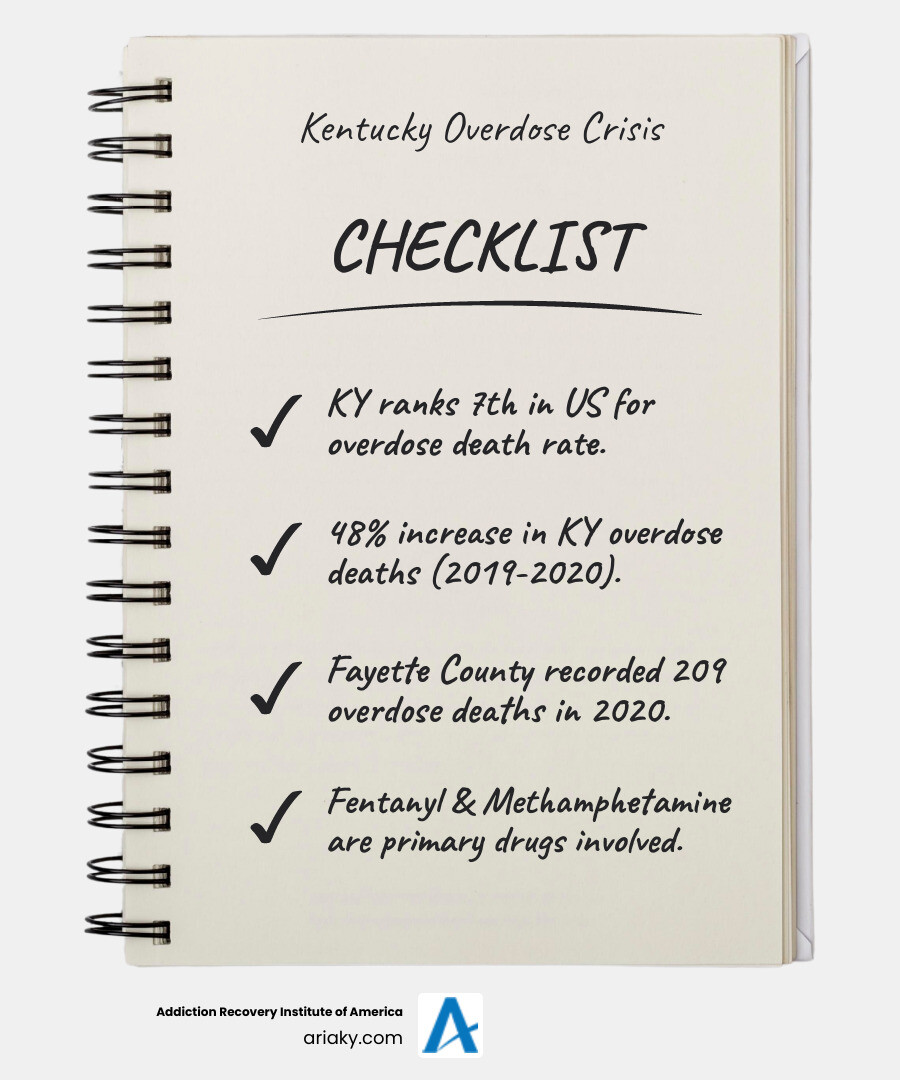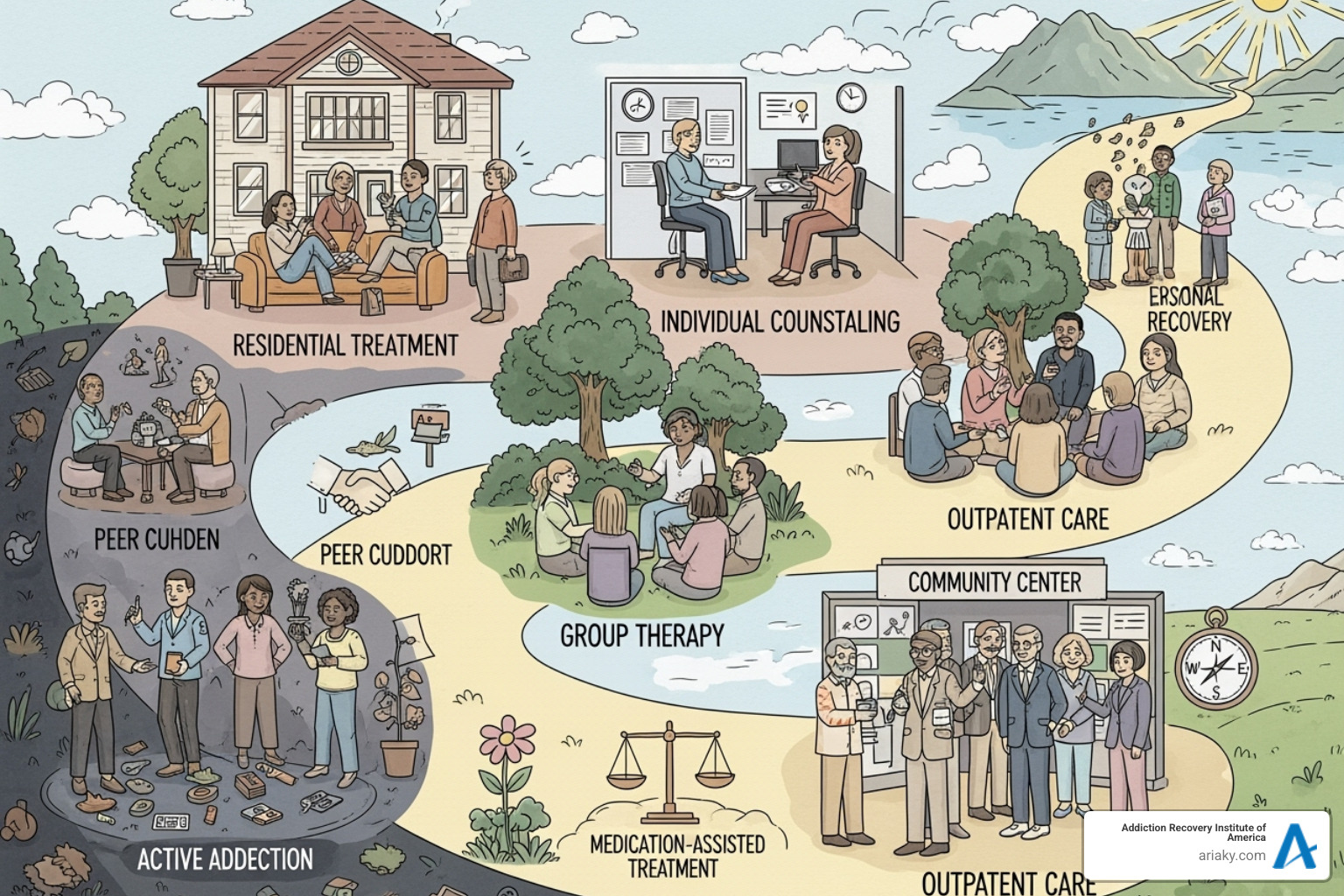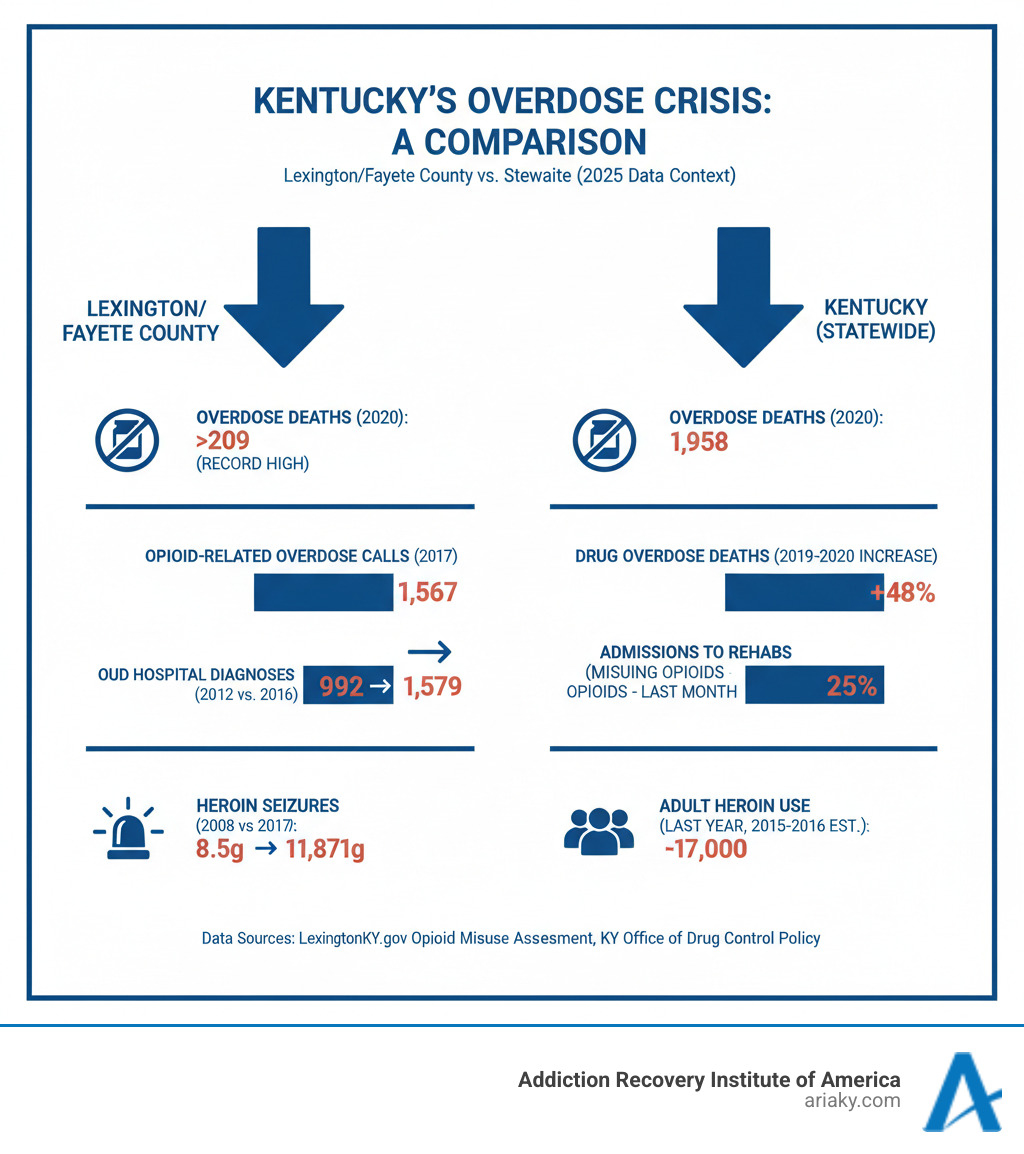Understanding Lexington’s Need for Addiction Treatment
Drug rehab centers in lexington ky provide essential treatment for individuals struggling with substance use disorders in a city facing significant addiction challenges. Kentucky ranks 7th in the US for overdose death rate, with over 7,000 people losing their lives to substance overdose in the past six years.
Lexington’s addiction crisis reflects broader Kentucky trends. Drug overdose deaths increased by 48% from 2019 to 2020 statewide. In Fayette County alone, the coroner reported over 209 overdose-related deaths in 2020 – a record high. The Lexington Division of Fire and Emergency Services registered 1,567 calls for opioid-related overdoses in 2017.
Fentanyl has become the most common drug involved in fatal overdoses, followed by methamphetamine. Despite these sobering statistics, recovery is absolutely possible with proper treatment and support.
This guide will help you understand your options for addiction treatment in Lexington. We’ll cover different program types, what to look for in quality centers, insurance coverage, and local resources available to support your recovery journey.

Types of Addiction Treatment Programs in Lexington
Finding the right addiction treatment can feel overwhelming, but you don’t have to figure it out alone. The good news is that drug rehab centers in lexington ky offer many different types of programs, each designed to meet people wherever they are in their recovery journey.

Think of addiction treatment like a ladder – you start where you need to and move up or down based on how you’re doing. Some people need the most intensive care right away, while others can start with less structured support. What matters most is finding what works for you right now.
At Aria Kentucky, we believe every person’s story is different. That’s why we create individualized treatment plans that can change as you heal and grow stronger. Recovery isn’t a one-size-fits-all process, and your treatment shouldn’t be either.
Treatment programs can last anywhere from 30 days to several months or even longer. Some people do well with shorter programs, while others need more time to build a solid foundation. The important thing is giving yourself enough time to develop the tools and skills you’ll need for lasting recovery. You can learn more about your options in our guide to Kentucky Drug Alcohol Rehab Programs.
Inpatient vs. Outpatient Care
One of the first choices you’ll make is between inpatient (residential) treatment and outpatient care. Both have their place in recovery, and many people use both at different stages of their healing.
Residential treatment means living at the treatment center full-time, usually for 30 to 90 days or longer. You’ll have 24/7 support from medical staff and counselors, which can be a huge relief if you’re worried about staying sober on your own. The structured environment removes you from daily stresses and triggers, giving you space to focus completely on getting better.
This level of care works especially well if you have a severe addiction, struggle with mental health issues alongside substance use, or don’t feel safe in your current living situation. Think of it as hitting the reset button – you get to step away from everything and rebuild your foundation in a supportive environment.
Outpatient treatment lets you live at home while attending therapy and support sessions during the day or evening. This flexibility means you can keep working, going to school, or taking care of family while still getting professional help. It’s often a good fit if you have a strong support system at home or if you’re stepping down from a higher level of care.
The beauty of having both options is that you can move between them as your needs change. Many people start with residential treatment and then transition to outpatient care as they get stronger. For more information about treatment centers throughout the state, check out Drug Rehab Centers in Kentucky.
Stepping Down: PHP, IOP, and Sober Living
As you progress in recovery, you’ll likely move through different levels of care. These “step-down” programs help you gradually transition back to independent living while still providing the support you need.
Partial Hospitalization Programs (PHP) offer intensive treatment without requiring you to sleep at the facility. You’ll typically spend 5-7 hours a day, 5-7 days a week in treatment, making it almost like a full-time job focused on your recovery. This works well if you need more structure than regular outpatient care but don’t need round-the-clock supervision. Our Lexington PHP Treatment Complete Guide explains exactly how this program can support your recovery.
Intensive Outpatient Programs (IOP) provide a middle ground between intensive care and complete independence. You’ll attend therapy sessions for a few hours, several times a week, allowing you to balance treatment with work, school, or family responsibilities. This level of care is perfect if you’ve completed a higher level of treatment or if you have a moderate addiction and need solid support without disrupting your daily life. Learn more about our Lexington IOP Program to see if it’s right for you.
Sober living homes bridge the gap between treatment and going home. These are safe, substance-free houses where you live with other people in recovery. You’ll follow house rules, participate in chores, and support each other through the challenges of early sobriety. It’s like having roommates who truly understand what you’re going through.
Aftercare support is your safety net for long-term recovery. This might include ongoing therapy, support groups like AA or NA, alumni programs from your treatment center, or regular check-ins with a counselor. The goal is to build a strong network that will catch you if you stumble and celebrate with you as you succeed.
Moving through these different levels isn’t about graduating or failing – it’s about getting the right amount of support for where you are today. Some people move quickly through the levels, while others take their time. Both approaches can lead to lasting recovery.
What to Look for in Drug Rehab Centers in Lexington KY
Finding the right treatment center can feel overwhelming, but knowing what to look for makes the process clearer. When searching for drug rehab centers in lexington ky, focus on facilities that prioritize evidence-based care and individualized treatment plans.
Quality treatment centers share common traits that make recovery more likely. Accreditation from respected organizations like CARF or the Joint Commission shows a facility meets high standards. Qualified staff credentials matter too – look for licensed therapists, addiction counselors, and medical professionals who understand addiction as a disease, not a moral failing.
The best centers follow the Principles of Effective Treatment outlined by research. This means they tailor treatment to your specific needs and regularly check your progress to adjust the plan as you heal.
Substances Treated and Therapeutic Approaches
A comprehensive rehab center should treat the full range of substance use disorders common in our community. Alcohol addiction remains widespread and often requires medical detox – our Lexington Alcohol Treatment services address these specific needs with specialized care.
Opioid addiction – including heroin, fentanyl, and prescription painkillers – has hit Kentucky particularly hard. Effective treatment often includes Medication-Assisted Treatment (MAT), which combines FDA-approved medications with counseling. Methamphetamine and cocaine addictions require intensive behavioral therapies to help manage cravings and identify triggers.
The therapeutic approaches used make all the difference in recovery success. Cognitive-Behavioral Therapy (CBT) helps you recognize and change negative thought patterns that fuel addiction. Dialectical Behavior Therapy (DBT) teaches crucial skills like emotional regulation and distress tolerance – especially helpful if you struggle with intense emotions.
Holistic therapies like yoga, mindfulness, and art therapy complement traditional approaches by addressing your whole person, not just the addiction. Trauma therapy becomes essential since many people use substances to cope with past hurt or abuse.
Family therapy helps rebuild relationships damaged by addiction and creates a stronger support system for your recovery. You can explore the full range of options in our guide on Kentucky Addiction Treatment Therapy Programs.
Specialized Programs and Co-Occurring Disorders
Addiction rarely happens in isolation. Many people also struggle with mental health conditions like depression, anxiety, PTSD, or bipolar disorder. This is called dual diagnosis, and it requires integrated treatment that addresses both issues at the same time. The Prevalence of Any Mental Illness (AMI) shows how common these co-occurring conditions are.
Gender-specific programs create safe spaces where men and women can address unique challenges without distraction. Veterans programs understand the specific trauma and adjustment issues military personnel face. Trauma-informed care recognizes that many people have experienced abuse, violence, or other traumatic events that contribute to their addiction.
Some centers offer specialized support for pregnant women, ensuring both mother and baby receive proper care throughout recovery. Family therapy programs involve loved ones in the healing process, teaching everyone how to communicate better and support recovery together.
Amenities, Duration, and Aftercare Support
While comfort doesn’t cure addiction, a supportive environment helps healing. Look for centers that offer private or semi-private rooms, recreational activities like fitness centers or hiking, and life skills training to help you rebuild practical abilities. Yoga and meditation spaces support emotional wellness, while nutritious meals help your body heal from substance use.
Treatment duration significantly impacts success rates. While some programs last 28-30 days, research shows that longer programs of 60, 90 days or more often lead to better long-term outcomes. This gives you time for deeper therapeutic work and to practice new coping skills.
Aftercare support may be the most important factor in lasting recovery. Alumni programs connect you with others who’ve walked this path successfully. Relapse prevention planning gives you concrete strategies for handling triggers and cravings. Ongoing therapy and support groups provide continued guidance as you face new challenges in recovery.
These comprehensive approaches are available throughout the state – learn more on our Rehabs in Kentucky page. The right treatment center feels like a place where you can be honest, vulnerable, and hopeful about your future.
Navigating Costs, Insurance, and Payment Options
Let’s be honest – money worries often keep people from getting the help they desperately need. If you’re looking at drug rehab centers in lexington ky and feeling overwhelmed by potential costs, you’re not alone. But here’s something important to remember: addiction treatment isn’t just an expense, it’s an investment in your future.

Think about it this way – the cost of not getting treatment often far exceeds the cost of getting help. Lost jobs, broken relationships, legal troubles, and health problems add up quickly. The National Institute on Drug Abuse found that every dollar spent on addiction treatment saves between four and seven dollars in reduced crime and healthcare costs. You can read more about this in their guide, Is Drug Addiction Treatment Worth its Cost?.
The good news? There are more payment options available than you might think. Many people are surprised to find that treatment is much more affordable than they expected.
Does Insurance Cover Rehab in Lexington?
Here’s where things get encouraging. Most insurance plans today are required to cover addiction treatment just like they would cover treatment for diabetes or heart disease. Thanks to laws like the Affordable Care Act and the Mental Health Parity Act, insurance companies can’t treat addiction as a “lesser” medical condition anymore.
When you call drug rehab centers in lexington ky, the first thing they’ll typically do is verify your insurance benefits. This means they’ll contact your insurance company directly to find out exactly what’s covered under your specific plan. No guesswork, no surprises.
In-network providers will usually cost you less out of pocket, but don’t worry if your preferred treatment center is out-of-network. Many facilities work with out-of-network benefits too, and sometimes the difference in cost isn’t as big as you’d expect.
At our Lexington Rehab location, we handle all the insurance verification for you. Our admissions team knows exactly which questions to ask your insurance company, and they’ll explain everything in plain English – no confusing insurance jargon.
Private insurance plans typically cover various levels of care, from detox and residential treatment to outpatient programs like PHP and IOP. The key is understanding your specific benefits, including things like deductibles, copays, and any limits on treatment days.
Other Payment Options: Medicaid, Sliding Scale, and Private Pay
What if you don’t have private insurance? Don’t panic – there are still plenty of options to make treatment affordable.
Kentucky Medicaid has expanded significantly in recent years and now covers comprehensive addiction treatment services. Many people who didn’t qualify for Medicaid in the past may be eligible now. If you’re not sure whether you qualify, it’s worth checking – the application process is much simpler than it used to be.
State-funded programs offer another pathway to treatment. Kentucky has various grant programs and state funding specifically designed to help people access addiction treatment. These programs recognize that addiction affects everyone, regardless of income level.
Some treatment centers offer sliding scale fees, which means they adjust their prices based on what you can actually afford to pay. This isn’t charity – it’s smart healthcare. Centers know that when people get the treatment they need, everyone benefits.
Private pay remains an option for those who prefer to handle costs directly or have high-deductible insurance plans. Many facilities offer payment plans that break treatment costs into manageable monthly payments. Some even work with healthcare financing companies that specialize in treatment loans with reasonable terms.
The most important thing to remember is this: don’t let money fears stop you from making that first phone call. Every reputable treatment center has financial counselors whose job is to help you find a way to afford treatment. They’ve seen it all, and they’re genuinely committed to helping you find a solution that works for your situation.
Kentucky’s Addiction Landscape: Laws, Statistics, and Support
Understanding Kentucky’s addiction landscape helps put Lexington’s challenges into perspective. The state has been working hard to address the crisis through both legal reforms and community support, creating a foundation that helps drug rehab centers in lexington ky provide more effective care.
Key Drug Laws and Local Statistics
Kentucky recognized early on that fear of legal consequences was preventing people from seeking life-saving help during overdoses. That’s why the state passed the Kentucky Good Samaritan Law (SB192), which protects people who call for help during an overdose from prosecution for possession of drug paraphernalia or small amounts of drugs for personal use. This simple but powerful law has likely saved countless lives by encouraging people to act when someone is overdosing.
The state has also made naloxone (Narcan) more accessible by allowing certified pharmacists to dispense it without a prescription. This means more families and community members can have this life-saving medication on hand when it’s needed most.
The statistics from our community show just how urgent this crisis has become. Looking at the numbers side by side helps us understand the scope of what we’re facing:
| Statistic | Lexington/Fayette County | Kentucky (Statewide) |
|---|---|---|
| Drug Overdose Deaths (2019-2020 increase) | N/A | 48% increase |
| Opioid-Related Overdose Calls (2017) | 1,567 calls | N/A |
| People Diagnosed with Opioid Use Disorder in Hospital (2012 vs. 2016) | 992 (2012) to 1,579 (2016) | N/A |
| Heroin Seizures (2008 vs. 2017) | 8.5 grams (2008) to 11,871 grams (2017) | N/A |
| Kentuckians (18+) using Heroin (last year, 2015-2016 estimate) | N/A | Approximately 17,000 |
| Admissions to subsidized rehabs misusing opioids (other than heroin) 12 months prior to treatment | N/A | 46% |
| Admissions to subsidized rehabs misusing opioids (other than heroin) 1 month prior to treatment | N/A | 25% |
| Admissions to subsidized rehabs using heroin 12 months prior to treatment | N/A | 14% |
| Admissions to subsidized rehabs using heroin 1 month prior to treatment | N/A | 6% |
| Overdose Deaths (2020) | Over 209 (record high) | 1,958 |

These numbers from the Opioid Misuse Resource and Needs Assessment for Fayette County, Kentucky tell a story that’s both sobering and hopeful. Yes, the crisis is real and growing. But they also show that more people are seeking treatment and that our community is responding with resources and support. This data directly shapes how we approach treatment at drug rehab centers in lexington ky and informs our work throughout the region, including our Addiction Treatment Louisville KY services.
Finding Help Beyond drug rehab centers in Lexington KY: Helplines and Support Groups
Recovery doesn’t happen in isolation. While professional treatment is often the foundation, lasting sobriety usually involves building a network of support that extends far beyond the walls of any treatment center. Lexington offers a rich variety of resources that can complement formal treatment or provide immediate help when you need it most.
When you’re in crisis or just need someone to talk to, national helplines are available around the clock. SAMHSA’s National Helpline at 1-800-662-HELP (1-800-662-4357) is completely confidential and free. The staff can connect you with treatment facilities, support groups, and community resources in your area. If you or someone you know is having thoughts of suicide or is in emotional crisis, the National Suicide Prevention Lifeline is just three digits away – simply call or text 988 for immediate support.
Support groups offer something that professional treatment sometimes can’t – the lived experience of people who truly understand what you’re going through. Alcoholics Anonymous (AA) and Narcotics Anonymous (NA) have been helping people stay sober for decades through their time-tested 12-step programs. These meetings happen throughout Lexington, often multiple times per day, and they’re completely free. The sense of community and shared experience can be incredibly powerful, especially during those difficult early days of recovery.
For those who prefer to start their search online, FindTreatment.gov is an excellent resource. You can search for treatment facilities by location, type of care needed, and payment options – all from the privacy of your own home.
These community resources work hand-in-hand with the professional care provided by drug rehab centers in lexington ky. Together, they create a safety net that can catch you when you fall and help you climb back up again.
Conclusion: Your Path to Recovery in the Bluegrass State
Recovery from addiction is one of the most courageous journeys you can take, and the good news is that you don’t have to take it alone. Throughout this guide, we’ve explored the many ways that drug rehab centers in lexington ky are equipped to support you, from the moment you decide to seek help through long-term sobriety.
The landscape of addiction treatment in Lexington is comprehensive and hopeful. Whether you need the intensive support of residential care, the flexibility of outpatient programs, or the structured transition of PHP and IOP services, options exist to meet you exactly where you are. The statistics we’ve shared paint a serious picture of Kentucky’s addiction challenges, but they also highlight something equally important: the community’s commitment to healing and recovery.
Recovery is absolutely achievable. Every day, people just like you are taking that first brave step toward a healthier, more fulfilling life. The evidence-based therapies, specialized programs for co-occurring disorders, and trauma-informed care available through quality treatment centers provide the tools and support needed for lasting change.
We understand that concerns about cost and insurance can feel overwhelming, but treatment is an investment in your future. With options ranging from insurance coverage to Medicaid, sliding scale fees, and payment plans, financial barriers don’t have to stand in your way. The admissions teams at reputable centers are experienced in helping people steer these challenges.
Kentucky’s supportive laws, like the Good Samaritan Law, and the availability of naloxone show a state committed to saving lives and supporting recovery. Beyond formal treatment, the network of support groups, helplines, and community resources creates a safety net that extends far beyond any single program.
The most important step is the first one. At Addiction Recovery Institute of America, we’ve seen countless individuals transform their lives through personalized, compassionate care. Our accredited, AODE-certified programs in Kentucky offer everything from detox through aftercare, all designed around your unique needs and circumstances.
You deserve a life free from the grip of addiction. You deserve hope, healing, and the chance to refind who you truly are. The Bluegrass State offers not just beautiful landscapes, but also the dedicated professionals and proven programs that can help you build the foundation for lasting sobriety.
Your recovery story is waiting to be written, and it can begin today. Find the right Kentucky rehab center for you and take that first step toward the life you deserve.


